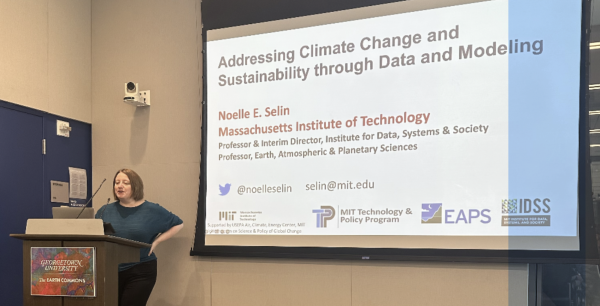The Georgetown University Earth Commons Institute, a center for environmental and sustainability innovation, research education and action, hosted a talk Feb. 9 titled “Addressing Climate Change and Sustainability through Data and Modeling” as part of their weekly ECo Talks series.
The weekly ECo Talks seminars bring in leading experts from Georgetown and beyond to discuss timely environmental issues by showcasing their research. Noelle Eckley Selin, an associate professor at Massachusetts Institute of Technology (MIT) whose work analyzes air pollution, climate change and environmental contamination, spoke on how her team is leveraging data modeling to mitigate climate change.
Selin said her research group advises policymakers using data modeling to identify which sources of carbon dioxide, greenhouse gases and pollutants are most damaging to the environment, the economy and human health.
According to Selin, the goal of her research is to bring climate initiatives closer in line with the United Nations sustainable development goals, in particular those impacting sustainable health and affordable, clean energy.
“The question that really motivates my research group is, ‘How do we think about using modeling and data analysis to advance decision-making when we have goals of sustainable development?’” Selin said at the event. “Largely climate action, good health and well being, particularly in the area of air pollution, and affordable and clean energy. And the challenge is that we’re making decisions about a system in which all of these goals are interacting and trading off.”
Tim Bartley, a professor at the Earth Commons Institute and the department of sociology at Georgetown, said at the event that Selin is at the forefront of a world linking science and public policy.
“Dr. Selin’s work is at the heart of the science-policy interface. It’s a pretty small number of people that, in my mind, bridges the divide between the natural sciences and the social sciences,” Bartley said at the talk.

Selin said one focus of her research is addressing the pollution generated by coal power plants, using data on mortalities caused by air pollution to inform decision-making in the energy transition from coal power plants to forms of renewable energy.
“Our group has done a lot of research saying that if you’re transitioning from dirty fossil fuel-driven combustion to cleaner sources of energy, you not only benefit the climate by reducing CO2 emissions, but you also can reduce these air pollutants that have benefits to human health in the near term,” Selin said.
Established research similarly shows that inhaling large amounts of particulate matter released by these power plants can cause cardiovascular and respiratory damage with potentially fatal consequences.
One of the hosts of the weekly ECo Talks, Megan Lickley, assistant professor at the Earth Commons and School of Foreign Service (SFS), further highlighted Selin’s work regarding fossil fuel emissions.
“Prof Selin’s work shows that not all greenhouse gas emissions are created equal. The burning of fossil fuels not only warms the planet but also worsens regional air quality. Professor Selin made this point for a few examples, including some work by her graduate student Dr. Lyssa Freese (SFS ’16) who modeled this effect from power plants across the US in order to identify policies that can prioritize emissions reductions to minimize harm,” Lickley wrote to The Hoya.
In addition to population-level data modeling, Selin’s team researched how MIT can design campuswide and institutional initiatives to meet its zero-carbon commitments. She said researchers should focus on goals with the broadest potential sustainability impacts, especially those in line with the sustainable development goals.
“We have reductions that are coming in deadlines in 2026 like most universities. But we have to think about which ones to encourage,” Selin said. “We realized that these CO2 reductions have broader sustainability impacts in ways that relate to our sustainability goals.”
At the end of the event, Selin said scientists and everyday people alike should consider the long-term impacts of climate change, mapping out the wider effects of problems such as air pollution driven by coal use.
“That’s the challenge of, ‘How do you view the longer-term climate impacts versus the near term?’ And from a climate perspective, this is one of the things you’re trying to have to think about, some of the technological advancements and what causes and effects,” Selin said. “Even just mapping out what those trade-offs are helps people figure out the problem.”








